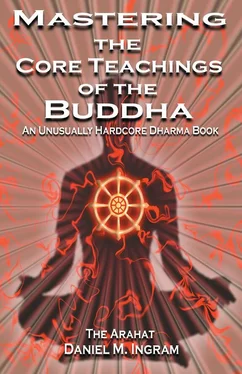Daniel Ingram - Mastering the Core Teachings of Buddha - An Unusually Hardcore Dharma Book
Здесь есть возможность читать онлайн «Daniel Ingram - Mastering the Core Teachings of Buddha - An Unusually Hardcore Dharma Book» весь текст электронной книги совершенно бесплатно (целиком полную версию без сокращений). В некоторых случаях можно слушать аудио, скачать через торрент в формате fb2 и присутствует краткое содержание. Год выпуска: 2009, ISBN: 2009, Издательство: Aeon Books, Жанр: Старинная литература, на русском языке. Описание произведения, (предисловие) а так же отзывы посетителей доступны на портале библиотеки ЛибКат.
- Название:Mastering the Core Teachings of Buddha - An Unusually Hardcore Dharma Book
- Автор:
- Издательство:Aeon Books
- Жанр:
- Год:2009
- ISBN:9781904658405
- Рейтинг книги:5 / 5. Голосов: 1
-
Избранное:Добавить в избранное
- Отзывы:
-
Ваша оценка:
- 100
- 1
- 2
- 3
- 4
- 5
Mastering the Core Teachings of Buddha - An Unusually Hardcore Dharma Book: краткое содержание, описание и аннотация
Предлагаем к чтению аннотацию, описание, краткое содержание или предисловие (зависит от того, что написал сам автор книги «Mastering the Core Teachings of Buddha - An Unusually Hardcore Dharma Book»). Если вы не нашли необходимую информацию о книге — напишите в комментариях, мы постараемся отыскать её.
Mastering the Core Teachings of Buddha - An Unusually Hardcore Dharma Book — читать онлайн бесплатно полную книгу (весь текст) целиком
Ниже представлен текст книги, разбитый по страницам. Система сохранения места последней прочитанной страницы, позволяет с удобством читать онлайн бесплатно книгу «Mastering the Core Teachings of Buddha - An Unusually Hardcore Dharma Book», без необходимости каждый раз заново искать на чём Вы остановились. Поставьте закладку, и сможете в любой момент перейти на страницу, на которой закончили чтение.
Интервал:
Закладка:
Nothing helps in the end but understanding the fundamental nature of reality, i.e. the Three Characteristics.
It may often be true that people simply are not in a position where insight practices are appropriate for them. Insight practices are not for everyone. One of the clear marks of whether or not they are
appropriate for someone is their ability to even do them in the first place. If despite clear instructions and appropriate support a would-be insight meditator is simply unable to do anything but spin in content and fixation, they should try something else until such time as they can hear, understand and then follow the extremely basic but specific instructions of insight practices.
The last and perhaps most pernicious of the reasons that students don’t really apply themselves is that they don’t actually believe it can be done, that they could actually get enlightened or that anyone else except a rare few get enlightened. Further, if they do know of an potentially enlightened person, such as a lineaged teacher, that person typically becomes thought of as being “other,” an aberration, one of “those over there,” one of the chosen ones, and somehow surreal, like an imagined demi-god.
This has been a terrible problem since the very beginning of all mystical traditions, and is unfortunately unlikely to go away any time soon. Part of this is due to the “Mushroom Factor,” but there are many other complex reasons for it. Suffice to say, it can be done and is done today by students using these simple practices. Find someone enlightened who is willing to talk more about this if you want specific examples, and see the chapter called More on the “Mushroom Factor.”
110
16.A CLEAR GOAL
Many of the possible reasons for why people can get so into
“Buddhism” in every way except clear, well-defined, focused and precise practice are directly related to a lack of a clear goal. If you have no clear idea of what you want or why you are doing something, then the results are likely to be just as murky, vague, and fragmented. Why are you doing all of this? This is a very important question.
People may wish to go on a retreat and have the whole thing be relaxing and blissful. This can actually be attained temporarily if they then gain some mastery of concentration practices, though their clarity will almost certainly shatter the instant they leave the retreat, as concentration practices produce no long-term stability on their own.
However, they may think that they wish to get enlightened by doing insight practices. Insight practices involve hard work and clear, non-anesthetized examination of suffering, among other things. Thus, these two goals of maintaining bliss and developing insight simultaneously are in direct conflict, and the student’s practice will surely be conflicted.
This is just one of many possible examples.
Having a clear goal is absolutely fundamental to the practice in more ways than may be initially obvious. In fact, if you understood your actual reality right now clearly enough to get to the root of why you were doing all of this and where all this motion of mind comes from, you would be highly realized. You would penetrate to the heart of compassion and suffering, of ignorance and emptiness, and be finally free.
I do not write this lightly. It is completely vital that your motivation be as clearly understood as possible as it actually is and that all of its energy be channeled into realizing you goals. Wishy-washy practice brings wishy-washy results, and determined, well-guided, brave, and wholehearted practice may bring the desired results.
Knowing what is possible helps, i.e. what each of the trainings can and cannot accomplish. I will spell out the details of such things in Part III. The specifics of our goal may change with time as we become more familiar with the realities of these, but the core motivation for all of this never changes. That is quite a statement, given that all things are impermanent, and about as big a hint as can be given. Whatever
A Clear Goal
ultimate truth you want on the spiritual path is to be found in the sensations of the wanting itself.
Thus, don’t look out there except to find wise guidance about how to look inward, for what you are looking for is “nearer than near.” It is in the looking. It is in the motivation. It is in the suffering, which is why this was the First Noble Truth that the Buddha taught. He went right for the heart of the thing. It is in the question itself, which is why koan training can work. The experience of the question contains the answer to the content of the question. It is in the undying love that drives our every wish for happiness.
Strangely, the process of creating the illusory sense of a self arises out of compassion, but confused compassion, which is desire. This may sound odd, but it is as if there was an eddy in reality that befuddled empty and compassionate awareness, which is not a thing nor separate from things. Thus, somehow it seems that there is something to defend, some separate self that must be protected. Thus, out of confused compassion, barriers and defense mechanisms continue to be erected to defend this territory, this illusion of a separate self. Spiritual practices are designed to systematically debunk this illusion and penetrate these barriers by providing clarity, whereas all of the traditions can easily become part of these barriers, cultures to defend, knowledge to assume is self or owned by self, and that sort of thing.
It is as if reality got caught in an unfortunate loop, and this is what we have to work with, as this loop of illusory duality thinks it is us. The natural tendency, given “our” lack of clarity, is to continue to defend this
“self” out of compassion and a lack of understanding that there never was such a thing. This defense and identification is the process of ego.
Interestingly enough, all of the phenomena that make up this process, i.e. all of the “defilements,” are themselves empty, intrinsically luminous and non-dual, though they seem otherwise by their own contrivance.
Teachings such as “you are already enlightened, but you have yet to realize it” point to this (see Moon in a Dewdrop, The Writings of Zen Master Dogen, edited by Kazuaki Tanahashi, for a particularly profound discussion of the uses of this dangerous point of view). Thus, realization is not something created but instead is discovered as being an intrinsic aspect of phenomena.
112
A Clear Goal
Thus, with enough stability and clarity (concentration and wisdom), this natural, compassionate process of manifestation can begin to function more skillfully, as it has better information to go on, and can begin to see that creating the illusion of a separate, permanent self was not at all helpful (though it seemed to be). At this point, “it” will then let go of the illusion it has been perpetuating and return to understanding its natural state, which is freedom and non-duality.
This is something that absolutely cannot be accomplished by an act of will. It only arises when the level of clarity is high enough and the heart accepting enough of things as they are. One might say that Grace favors the well-trained mind. The pronounced tenaciousness of this process of defending an illusory and arbitrary “self” demonstrates clearly just how much compassion and how much confusion there is in this. Work to see clearly so that the knot may begin to untie itself.
I include all of this in the section called “A Clear Goal” because the very sense of a drive to find something is actually the thing it is seeking.
The motivation is looking for itself. In those sensations themselves is something very powerful and amazing. However, in order to see this, a shift has to happen in which the drive becomes driven to understand the sensations of that drive itself rather than looking to future sensations for satisfaction. This is a completely unintuitive thing to do, and this is one reason why meditation practices can seem so awkward sometimes.
Читать дальшеИнтервал:
Закладка:
Похожие книги на «Mastering the Core Teachings of Buddha - An Unusually Hardcore Dharma Book»
Представляем Вашему вниманию похожие книги на «Mastering the Core Teachings of Buddha - An Unusually Hardcore Dharma Book» списком для выбора. Мы отобрали схожую по названию и смыслу литературу в надежде предоставить читателям больше вариантов отыскать новые, интересные, ещё непрочитанные произведения.
Обсуждение, отзывы о книге «Mastering the Core Teachings of Buddha - An Unusually Hardcore Dharma Book» и просто собственные мнения читателей. Оставьте ваши комментарии, напишите, что Вы думаете о произведении, его смысле или главных героях. Укажите что конкретно понравилось, а что нет, и почему Вы так считаете.












